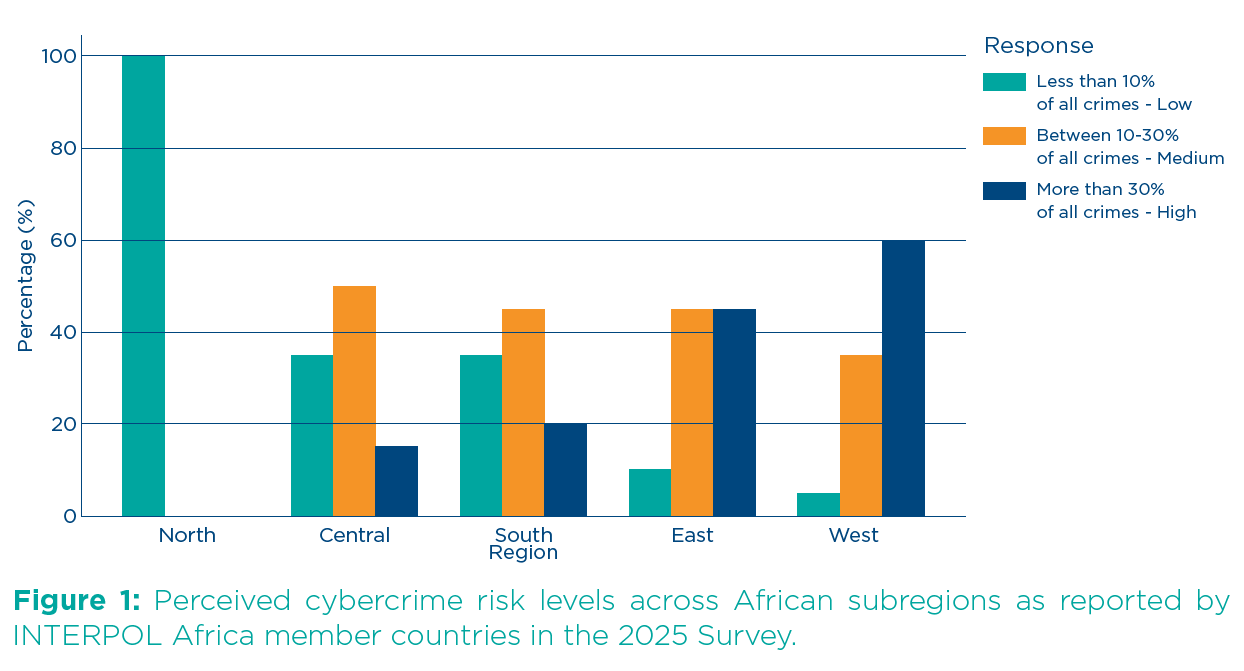Sharp rise in cybercrime across Africa¶
A new INTERPOL Africa Cyberthreat Assessment Report, released on June 23, 2025, shows that cyber-related offences now comprise a substantial portion of criminal activity across the continent. Two-thirds of surveyed member countries said cybercrime made up a medium‑to‑high share of all reported crimes rising to over 30% in Western and Eastern Africa.
Primary cyber threats underway¶
Online scams, notably phishing, remain the most frequent threat. Scam notifications in some countries soared by 3 000% in the last year, based on Kaspersky data. Ransomware detections surged in 2024, with South Africa reporting 17 849 incidents, Egypt 12 281, Nigeria 3 459, and Kenya 3 030. Business email compromise (BEC) has spread widely, with 11 African nations generating most of the continent’s BEC fraud, including Nigeria’s notorious Black Axe syndicate. Digital sextortion is up across 60% of countries, often using authentic or AI-generated imagery. Solving these threats demands high-level capabilities and no single nation can tackle them alone, INTERPOL’s Cybercrime Director Neal Jetton warns.
Severe challenges in enforcement¶
The report highlights significant deficiencies in legal frameworks and response capacity. 75% of countries say laws and prosecution need enhancement, and 95% report gaps in training, resourcing, or forensic tools. Infrastructure is weak: 30% have incident reporting systems, 29% maintain digital evidence repositories, and only 19% operate a cyberthreat intelligence database. International cooperation is hampered: 86% report slow processes, limited networks, and data access issues. Public–private collaboration is also lacking, with 89% identifying inadequate engagement channels.
Emerging technological threats¶
Cybercriminals increasingly use AI to scale fraud and sextortion. The report warns that AI-enabled scams are evolving rapidly, requiring urgent attention. Criminals also employ deepfakes, AI‑generated audio, and videos to add realism to their attacks.
Signs of resilience and progress¶
Some African nations are making important strides. Several have reformed legal frameworks and aligned cybersecurity laws with international standards. They have also set up specialized cyber units and built digital forensics capacity.
Two major INTERPOL-coordinated operations Operation Serengeti and Operation Red Card netted over 1 000 arrests and dismantled hundreds of malicious networks. These successes show that well‑coordinated efforts yield meaningful results.
Strategic recommendations for the future¶
The report suggests a six‑point roadmap: 1. Strengthen national enforcement capacity. 2. Upgrade legal frameworks to reflect modern cyber threats. 3. Enhance regional and international cooperation. 4. Increase public awareness and prevention. 5. Build better public–private collaboration. 6. Adopt emerging technologies for threat detection and disruption.
Implications for cloud security and Azure professionals¶
For those building and managing Azure infrastructure: 1. Enforce strong authentication with MFA and managed identity. 2. Monitor for BEC‑style attacks using Azure Sentinel to inspect emails and AD sign‑ins. 3. Track and respond to ransomware behavior using Azure Defender and backup systems. 4. Secure media storage in Azure with encrypted containers and sensitive data classification. 5. Enable reporting and logging via Azure Monitor. 6. Collaborate internationally through Azure’s global datacenter presence and secure connectivity options.
Final thoughts¶
Cybercrime in Africa is escalating in scale and technical sophistication. However, growth in legal capacity, enforcement, and international collaboration offers hope. For cloud and security practitioners, particularly within Azure, aligning with global best practices and investing in detection and response capabilities is critical. These steps can help Africa protect its digital transformation journey.

